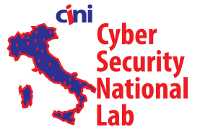Camillo Carlini
Research Fellow at SAPIENZA University of Rome:
- DIAG (Department of Automation and Management Engineering)
- CIS (Cyber Intelligence and information security)
Camillo Carlini was born in San Benedetto del Tronto in 1985 and he has his degree on Informatics for Management at University of Bologna. Master’s Degree in Computer Science always at University of Bologna. Master’s Degree on C# and .net. During his studies he has developed a thesis on the steel production cycle analyzing the process of the supply chain from the extraction of the mineral up to the complete transformation and realizing a system dynamics model. He worked such as external consultant front-end software development at YOOX Group. He participated in some research projects at national and international level. He was a policy analyst on the CROSSOVER project. He has collaborated with DIAG (Department of Automation and Management Engineering) of University of Rome “La Sapienza” as a scientific researcher, with a particular focus on CRISADMIN project, funded by the 2011 CIPS grant, in cooperation with the Sapienza Research Center for Cyber Intelligence and Information Security. The goal of the project was to develop a tool that will be able to evaluate the impact of large catastrophic events and/or terrorist attacks on critical infrastructures analysing the interdependencies between critical infrastructures and the modalities through which they are affected by predictable and unpredictable catastrophic events (terrorist attacks, natural and industrial disasters). Currently Camillo Carlini collaborate with DIAG as a scientific researcher yet, with a particular focus on ATTACS project. His specialties are: System Dynamics; Simulation Model; Policy analyst; Standard Definition; Program language (C#, Java, J2EE); Web – Oriented Achitecture; His publication are: Simulation of Critical Infrastructures Failures: a Theoretical Framework for Modelling Network Resilience (IFIP 2014); From a theoretical framework on critical infrastructures to a system dynamics model (EURAM 2014); A System Dynamics approach to Critical Infrastructures Interdependency Analysis: the experience of the CRISADMIN Project (ISDC 2014); Understanding security policies in the cyber warfare domain through system dynamics (ISDC 2014, DHSS 2014); Policy modeling as a new area for research: prospective for a Systems Thinking and System Dynamics approach? (EURAM 2013).




